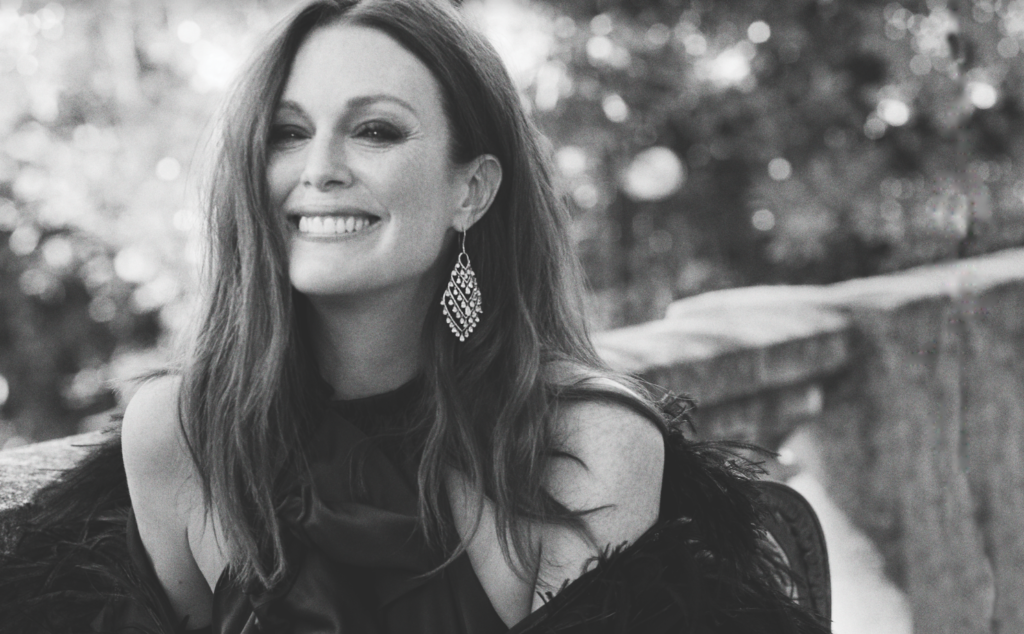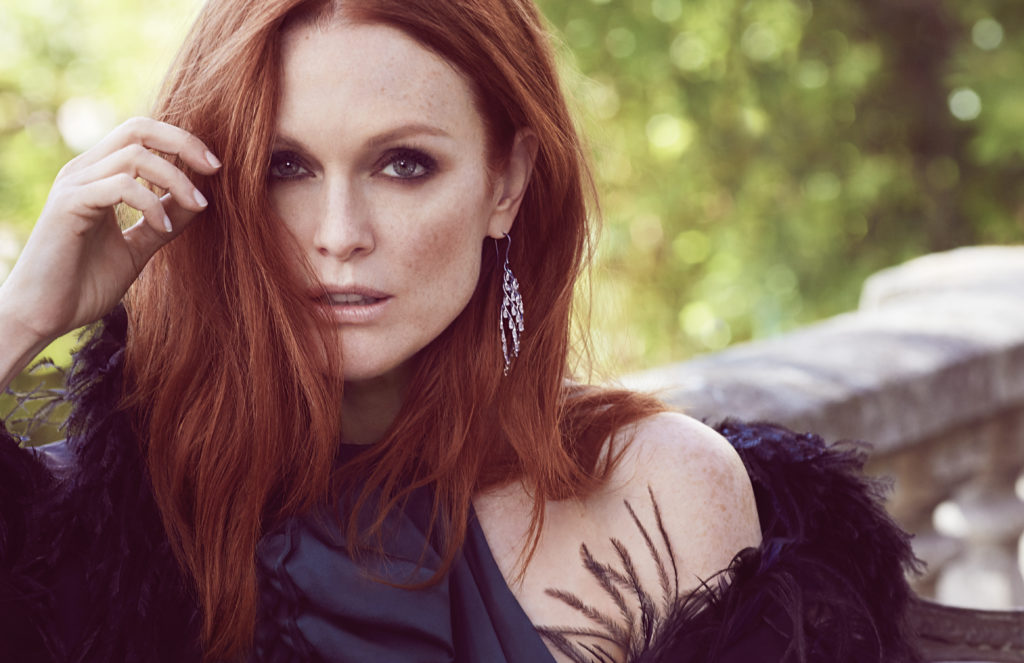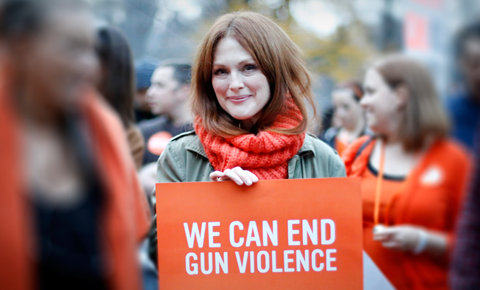
CYNTHIA ROWLEY: I loved the movie. Loved. First of all, on behalf of women over 50, thank you for the hot sex scenes in Gloria Bell.
JULIANNE MOORE: [Laughs] You’re welcome.
CR: Oh my god. I was like, Yeah.
JM: What I love about it, too, is that she goes to that club because she wants to dance. She’s there to dance, not necessarily to pick up men, and then she meets this guy and she takes him home and she sleeps with him and that’s the end. That’s what her expectations are. She’s not looking for any kind of relationship. When he calls later and asks her for a date, she’s like ‘Are you asking me out?’ And she’s sort of thinking, I don’t need this anymore. Sex is fine. End of story. Oddly, she gets kind of roped in by him; not the other way around.
CR: Does dating get harder or easier than when we were in our 20s?
JM: I think it’s all bad. I think it’s always bad. I don’t think it was fun in our 20s. I doubt that it’s fun now. I think having to spend time with someone who really is a stranger is challenging. Even getting to know a new girlfriend, you’re not even sure at first if the two of you are going to click or not. To go through all that, and then add a sexual element to it with a stranger…ew, that’s difficult.
CR: I also thought the odds that she was going to go to this bar and find a guy without any dating apps or all that, it was such a long shot. Thinking about dating, tell me about your worst date ever.
JM: My worst date ever was in college, in Boston. I worked in a lot of restaurants then. Unfortunately, I went out on a date with a customer, which is always a bad idea, but I was too young. I didn’t know any better. We had a nice date and we went and had dinner and wandered around Faneuil Hall. And then he was like, well, come back to my room and we’ll have a drink, and I walked in and he took off his clothes and just stood there in his underwear. I hadn’t even kissed the guy and I was like, what are you doing?! And I just left. I don’t remember the guy’s name or anything like that. I was shocked.
CR: But you knew to leave.
JM: Of course.
CR: Yeah, that’s bad. Is vulnerability your greatest asset as an actor while filming? Since there were so many nude scenes. Or just vulnerability in general.
JM: I think it’s everybody’s best asset. That’s what makes us most human: the fact that we’re permeable. What’s great about Gloria is that she’s so vulnerable, but so resilient. She takes it. She feels everything that comes her way and keeps going, so this idea of being tough, of not letting stuff in, that’s not human. We’re not like that. We’re people who feel things and experience things and have real highs and real lows. That’s drama. That’s real-life excitement.
CR: It definitely shows through in the movie. What is your most famous nude scene before this? And does it involve a blow dryer?
JM: No, no, no. Let’s not go there.
CR: Well, there’s a lot of dancing in the movie. Do you have a favorite dance scene in a movie in history?
JM: Dirty Dancing. That’s the best one ever, right? What Jennifer Grey and Patrick Swayze did in Dirty Dancing is unparalleled. Well, that’s not fair because then there’s all the old…
CR: Fred Astaire and all of that.
JM: That kind of stuff, but I think for me growing up, it was Dirty Dancing.
CR: That’s perfect. I also saw this film as a meditation on loneliness. What are some of the other themes that appealed to you about this role?
JM: That she was a whole woman. You got to see this woman in her entirety. You saw her at work, you saw her with her friends, you saw her engage with her children and with her mother. I love the fact that when she’s in trouble, the only person she can think of to call, the only person she tells this happened, is her mom. And her mom bails her out. That’s a really wonderful thing. It’s wonderful to see that happen with an older woman and her mother. Not just a very young woman.
CR: That it never ends.
JM: It never ends.
CR: The other part of the movie that I thought was interesting is your daughter’s boyfriend.
JM: The surfing part? You like the surfing part?
CR: Yeah. Knowing the men in your family surf, were there other parellels in the movie to your real life?
JM: Not really. As you know, I watch, I don’t surf. But even watching is fun, and that was the other thing, actually, about transposing her life to mine. I was like, oh my god, yeah, she could have a boyfriend who came to surf in California and was a big wave surfer. I loved the fact that she’s a yoga teacher too, because I’m a yogi. I think one of the things that’s really important to say about this movie is that it’s so pleasurable. It’s really fun and really easy to watch. Everybody leaves feeling great.
CR: Exactly. It’s not the typical…I don’t want to give it away.
JM: I know. Don’t give it away. But it’s like life. It’s like the drama of real life.
CR: There were so many relatable things throughout the movie, and it’s almost like you were left to have your own ending. John Turturro’s character, Arnold…he was outstanding.
JM: I love John so much. He’s the best.
CR: He reads Gloria poetry in the film.
JM: Yeah, I love the closeness, the intimacy of their relationship and then the fact that they’re also strangers. There’s so much that they don’t know about each other.
CR: If a guy was going to romance you, what would be his best way to get ahead? Apologies to Bart [Freundlich, her husband] in advance.
JM: I don’t know. Having been with the same man for 23 years, it’s hard to know, but the thing that’s great about my husband—and your husband, too—is that they’re present. They’re there when you’re at home. They’re there with your family, they’re there to meet your friends and to talk to you and be with you and support you in your work and in your life, and they’re genuine friendships, too. Someone really paying attention to who you are is the most romantic thing.
CR: Perfect. Thinking about family, ultimately you’re a working mom, so I’m wondering if you have any advice for shutting out work and being present when you’re home.
JM: It’s easier for women…I don’t know, maybe that’s wrong. For me, I actually found that once I had children, it was easier for me to compartmentalize my work because when you have little children, they’re not interested in it. They just want you to be their mom, so you have to walk in the door and that’s it. You’re done.
CR: Forget about everything.
JM: Yeah, and it is possible. It’s funny; I was just on Watch What Happens Live with Diane von Furstenberg. She’s a great role model, because she’s always saying you can have it all. Yeah, you can. It’s challenging to have a family and to have a career and to have a life, but isn’t that what life is all about? Why do you have to say to yourself you can’t? Why not? You have one life, do what you want with it. Try to do everything.

CR: That’s so inspiring. I always thought it was funny when people would say, ‘Oh you have two kids. That must be so hard.’ No, it’s twice the fun.
JM: Twice the fun, yeah.
CR: Let’s talk a little bit about fashion. Have there been specific roles where the clothes, as costumes, are especially transformative in developing the character? Have you ever stolen—I mean, been gifted—an outfit from the set? Like, for instance, Harrison Ford got to keep his hat from Indiana Jones.
JM: Clothes are significant in everything that you do. There are certain costumes that might be more memorable in a fashion sense—that people are like, oh my god, those clothes—but as you know, clothes are signifiers. So everything that you wear, everything that you put on your body, is directly or indirectly telling the world who you are or what you want to be. So you always have to think about that character and what they’re trying to communicate. Somebody like Gloria, her clothes…I don’t know if they’re memorable, but they are absolutely appropriate. You realize all her clothes are clothes that she can dance in. In terms of taking things from movies, what I’ve learned is, if you ever have something that you want to keep as memorabilia, that’s great, but you’ll never wear it again.
CR: Like maternity clothes.
JM: You put it on and you’re like who’s this? This isn’t me. This is this character. So I generally don’t take any clothes from the films. I’m just like, eh, I’ll never wear that.
CR: Now I know you love this subject…
JM: Is it about houses?
CR: Yes…
JM: Is it about me making you move your rug over?
CR: You said move the rug 3 inches and it changed everything.
JM: That’s right. Because when I walked in you were like what’s the matter with this rug. It was just in the wrong place. You just gotta move it.
CR: Well, actually I should’ve probably just redone the whole house.
JM: No, no you don’t need to redo the house. The rug was…the size was a little too small for the area, but it could be corrected just by moving it over a little. That’s all.
CR: Right, but you have an eye. You have a real eye, and it seems natural and you just can nail it right away.
JM: But the way you have it with clothes. I have a harder time looking at myself objectively, physically, and going, What looks good? I can see a space and figure out where to move the rug or where to put something higher or lower, but it’s harder for me to do it on a body.
CR: When it comes to home design, would you say you have a style that you love, or an era?
JM: Probably French, Italian and Scandinavian ’50s, ’60s, ’70s all mixed together. But I’m excited by anybody’s visual style. As long as it’s coherent, I love it.
CR: I always say mine is a little Royal Tenenbaums on acid or crack.
JM: I love it. It’s original. It looks like your family. It’s very inviting. It looks like you.
CR: Very messy.
JM: No, it’s not messy. It looks great.
CR: We’re sitting in my house right now by the way guys.
JM: Near the rug that I moved.
[Laughs]
CR: And I still haven’t done a few other things that you suggested, but I will.
JM: A house is an evolving, living thing, so you’re never done with a house. You’re always…
CR: Unfortunately.
JM: Or fortunately. It’s fun, too.

CR: This is a subject I definitely wanted to talk about. Arnold, your boyfriend in Gloria Bell, runs a paintball park, and I know you must be sensitive to how guns are portrayed in Hollywood, given your advocacy concerning gun safety, so I wanted to talk about Everytown For Gun Safety, and some recent big wins.
JM: The fact that the background check bill was just recently passed in the House—and Nancy Pelosi is a real hero—I actually do feel like the tide is turning. The majority of Americans are in favor of common-sense gun safety measures. We all want to keep our children safe. We want to keep everybody else’s children, every other community safe, and what’s happening right now, which is really exciting, is that all these diverse groups are coming together and saying this is our No. 1 issue. It’s a responsibility that we have as citizens, and as parents, to move forward on this.
I grew up in a time when my father was in the army and I had plenty of people in my family, I knew plenty of people who hunted, but back in the day it was like you didn’t handle a gun unless you were licensed and registered and you knew how to handle it properly. This idea that anybody should be able to get one at anytime is a false idea, and it’s all the NRA’s lobbying. It’s really important to remember that the NRA does not work for gun owners; they work for gun manufacturers. Their interest is in selling guns and ammunition, so it’s economics. When you talk to people who handle guns, who are around them, they know how carefully guns have to be handled, and with what restrictions.
CR: What you do for gun reform is amazing. You work really hard at it, and it’s working, and we’re very lucky for that. Now there’s also another Gloria in your life?
JM: Gloria Steinem! Like, how crazy?
CR: And I know you’ve been able to spend some time with her [while preparing for your role in the upcoming The Glorias: A Life on the Road]. Was she always a feminist hero for you?
JM: God, yeah. I’m playing one version of Gloria Steinem. Alicia Vikander plays another. Two little girls also play her. What’s been wonderful for me is doing the research and learning about her and how she evolved, and really listening to how consistent she’s been in her messaging and how patient she’s been. She’s a real example of someone who believes in something, and is able to kind of move the needle forward little by little by little. She’s a true feminist hero, and she will be remembered as one of the major figures of the 20th and 21st centuries.
CR: Definitely. Can we just talk about beauty for a minute? I see you a lot without a stitch of makeup, like right now, but I also see you get really dolled up, decked out. How do you keep your flawless skin?
JM: It is so dull to talk about sunscreen, but I’ve been wearing Olay SPF 15 on my face every day of my life since I was 23. Every day, I wear sunscreen. If I’m out in the sun, maybe in the summertime, I’ll wear something more. I’ll wear a hat and all that, but this everyday application of an over-the-counter sunscreen has made a major difference in my skin. That really helps.
CR: Bath or shower?
JM: Bath. If I can, I take a bath twice a day. When I’m out of town, I’ll take one in the morning before I go to work—even at 5 in the morning—and then at night before I go to bed. When I’m at home, less so.
CR: Yoga or Pilates?
JM: Yoga. I did Pilates for a really long time, but then I felt like yoga was more meditative.
CR: Barefoot or slippers at home?
JM: Barefoot. Oh no, actually I wear my furry Birks a lot.
CR: Gel or regular polish?
JM: Regular. Gel seems dangerous.
CR: It does last forever, though. Wax or laser?
JM: Wax.
CR: Yeah, we saw it.
JM: [Laughs] Yeah, you see it in the movie.
CR: Red, white or rosé?
JM: White. Rosé in the summer.
CR: Spa day or shopping day?
JM: You know what, I’ve decided to stop shopping for a year. Well, we’ll see how it goes. I mean it’s April and I haven’t shopped since the beginning of the year. I feel like I have so much stuff, so I really want to wear what I have, live with what I have and then we’ll see how long I can stand it.
CR: Oh, that’s good. Wait, I shouldn’t agree with that!





